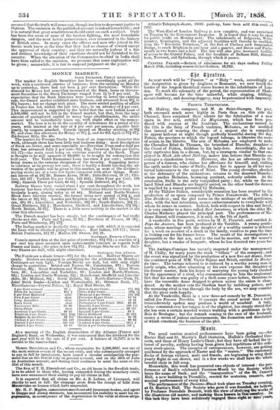z4latrts.
As next week will be " Passion " or " Holy " week, accordingly as the designation is given by Anglican or Romanist, we now touch the border of the longest theatrical recess known to the inhabitants of Lon- don. To mark the solemnity of the period, the representation of Shak- spare will become for the time unlawful, while singing, fiddling, mountebankery, and dancing-doggery, may be patronized with impunity.
FRENCH Trissmucm.s.
M. Hillery, the composer, and M. de Saint-Georges, the poet, both esteemed much more highly in Paris than on this side the Channel, have conjoined their talents for the fabrication of a new opera in five acts, entitled La Hagieisnme, which has been pro- duced with success at the Academic. The enchantress named in the title is the 'fairy of French tradition, Melusina, so far modified that instead of wearing the shape of a serpent she is (impelled to appear hideous at night though perfectly beautiful during the day. Milton, the province to which the legend belongs, is likewise the scene of action in the libretto. The arts of Melusina are employed to make the Chevalier Rene de Thouars, the betrothed of Blanche, daughter of the Count of Poitou, faithless to his lady-love. Accordingly, she not only captivates him in a dream, but, by a stratagem similar to that em- ployed in Much Ado about 1V'othing, makes him believe that Blanche en- courages a clandestine lover. However, she has an adversary in the person of a demon, who claims her affections for himself, and, visiting the earth under the name of Stello' forces her to appear in all her noc- turnal hideousness to the eyes of Rene. The young chevalier, shocked at the deformity of the enchantress, returns to the deserted Blanche; whose pardon Melusina, becoming penitent, ardently solicits. At the conclusion) Stolle is the only vanquished party ; for, while on the one hand Rene and Blanche are happily united, on the other hand the demon is repelled by a rosary presented by Meluaina. At the Theatre Italicn, considerable sensation has been created by the production of an opera composed by Prince Poniatowski. The title is Don .Desiderio ; and the plot turns on the mishaps of an old gentleman, who, with the best intentions, causes embarrassments to everybody with whom he comes in contact. Indeed, both with respect to idea and detail, it is very similar to a farce called Best Intentions, in which the elder Mr. Charles Mathews played the principal part. The performances of Ma- dame Ristori will commence, it is said, on the 7th of April. A vaudeville in five parts, written by M. E. Plouvier' and entitled Le Pays dee Amours, has been produced at the Varietes. A young gentle- man, whose marriage with the daughter of a wealthy 'usurer is deferred for a week on account of a death in the family, resolves to pass the time in looking out for his former loves. The result of his investigations is favourable to the fair sex, and in the end he marries not the usurer's daughter, but a vendor of bouquets, whom he has deserted two years be- fore.
The AmtigusComique has recently reopened under the management of M. Chilly, for many years the stock "villain" of the company; and the event was signalized by the production of a new five-act drame, from the combined pens of MM. Victor Sejour and Steel', entitled Is Martyr do Cams The torture referred to is endured by a worthy young man of lowly origin, who, after educating at his own expense the daughter of his former master, finds his hopes of marrying the young lady checked by the appearance of a rival, who communicating to him the unpleasant fact that his mother was guilty of a theft some years before, threatens to have the venerable dame dragged to prison unless the union is aban- doned. As the mother cute the Gordian knot by imbibing poison, and the menacing rival is ran through the body by the son, we may consider that the piece ends happily. At the Vaudeville, there is a new three-act comedy- by M. Dumanoir, called Les Femmes Terrible*. It conveys the sound moral that a word inconsiderately spoken may produce a world of mischief. A lady, whose command over her tongue is of the slightest, has simply stated that she has seen a certain married woman Walking with a gentleman in the Bois de Boulogne ; but the remark coming to the ears of the husband, causes a series of jealous embarrassments, the formation and dissolution of which constitute the business of the plot.


























 Previous page
Previous page